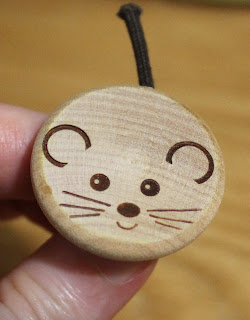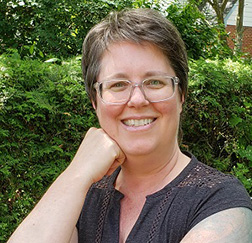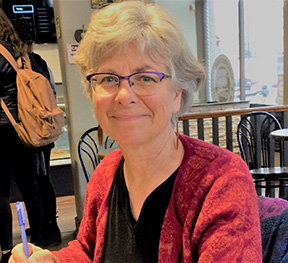Jerri’s Bio:
Jerri is a social justice and environmental activist, and writes fiction, both good and terrible, for joy. She is inspired by her family, her ten-year-old students, and a number of kick-ass non-profit groups.
Her fiction has appeared in The Penmen Review, (pending), Everyday Fiction, The Ottawa Arts Review, The Yale Review Online, The New Quarterly, The Antigonish Review, The Dalhousie Review, Room and is in two anthologies, Glass and Gardens: Solarpunk Summers (World Weaver Press) and Nevertheless: Tesseracts 21 (Edge Publishing). She mentors her students to write and perform a play each year and was honoured that her own play was performed in the Newmarket National Play Festival, July 2019. The actors were magnificent. She can be found at
www.jerrijerreat.com.
If you haven't done so already, check out Jerri's award winning story "Waves" and then return here for a chat with the author.
WOW: Congratulations on placing third in the Spring 2019 Flash Fiction Contest! What excited you most about writing this story?
Jerri: When I write, I am diving into myself. It’s a bit like falling into a dream. I read a variety of fiction in different genres, and nonfiction for teaching, or newsletters from Ecojustice, and a news magazine, Macleans. I listen to the CBC news. I talk with young students most of the day, with adults around that, go for walks and do errands. Life! Then, all these thoughts and images simmer together. When I sit down to do a 15-minute writing exercise I never know what will emerge. It’s so interesting to see how things kaleidoscope.
I have been drawn to reading articles and books about refugees for the past few years. Still, it was exciting, to feel a girl’s voice, fleeing from a war, bubbling up inside.
This particular tiny story emerged long after I began reading about the kindness and the cruelty of strangers toward modern refugees crossing the Mediterranean Sea. It is still happening. Just this week I received a newsletter from the U.N. group that works with refugees around the world, (U.N.H.C.R.). There was a news article about one of the survivors of an event in 2016 wherein pirates deliberately sunk a boat, killing over 500 people who were fleeing war.
I highly recommend the film, “Human Flow.” The numbers of people presently fleeing their homes because of war or climate change/famine is something we all need to be aware of. The United Nations keeps statistics, and updates them frequently. In 2017 there were over 65 million people fleeing their homes due to war or famine or other disasters. In 2019 there are over 70 million forcibly displaced people worldwide.
That’s more than after the World Wars. Now that I know it, it’s not something I can un-know. I think we all have to see this as a global change, and find positive solutions.
WOW: Thank you for sharing the background of not only your general writing process but also of the events that make your story so relevant and powerful. These statistics are shocking. It sounds like you’ve learned a lot through your research. What did you learn about yourself or writing while crafting this piece?
Jerri: I practiced an old Jedi mind trick: despite a dozen misgivings about what was appearing onscreen, I ignored them. I let my mind go. I don’t know why I went into the head of a young teen leaving Syria with her family. I’ve brought two lovely newcomer families (recently Syrian refugees) into my classroom to chat with my students. When my students asked why families were running away from their country and coming here, I’d simply shown some photos of Syria before and after the war. One visiting youth, about 15, was quite articulate and told us that what was strange for her about attending high school in Ontario, was that couples kiss in public. My students, aged 9 and 10, agreed that it was gross. This lovely girl wore a hijab, played soccer, and had two part-time jobs. She talked about missing her baby brother a lot while at school. Again, my students agreed with that feeling.
She didn’t have to take a boat; her family was sponsored by a group of local churches and the local mosque to come to Canada. A lucky family. My students raised a little money for this charity, “Save a Family from Syria”, the last two years.
After writing, I became very concerned that this piece might be seen as cultural appropriation. I didn’t send it out for a year, fretting. Finally, I decided that I would. I had written it in a spirit of deep respect for those families forced to leave their land, daring terrible dangers, because they had to. That is, truly, a universal theme throughout human history.
WOW: We are grateful to you for sharing your work with us! It clearly sounds like activism is a meaningful part of your life. How often and what ways does your activism inspire your fiction writing, and vice versa?
Jerri: I can’t avoid seeing the effects of climate change right here. We had tornadoes last winter, (I’ve never heard of them here), and it seemed like more ice storms and floods than lovely white snowy days. I’d never heard of Lyme Disease ten years ago but it’s a constant concern. Thus, I support Ecojustice, Environmental Defense, the David Suzuki Foundation, among others. As well, I tutored recent refugee children last summer, a small bit of volunteerism, and was very proud to follow my students last year on a path of peaceful protest to two levels of government about single-use plastics. Two students, aged ten, told me that they had counted over 40 plastic bags in the ditches, streams, and caught in trees on a bus ride to school one day.
However, I don’t write to preach. I write because I need to, and these underlying concerns sometimes slip into my fiction. This story was overtly about families in terrible danger, and I was drawn into a girl’s thoughts at such a time. I simply went there. I have written a story with magical realism called “The Narrow Café” which appeared in the Yale Review Online last fall. There, I was yanked into a story about a young man with family expectations who had a gift for making drinks. The refugee background was very slight. I did, however, enjoy writing two stories set in the future for two Solarpunk anthologies. Those stories had to be set in a future where climate change had generally been overcome for the most part, a refreshing change from dystopias and “Hunger Games” futures. For those, I researched all the latest emerging green energies. The worldbuilding was great fun. Then I wrote a story about a young woman and her fiancée on a canoe trip, a sort of a marriage test, set in that future! (Note: if you have ever taken a lover camping for the first time, you might be able to relate.) The anthology is called “Glass and Gardens: Solarpunk Summers.” The company is now publishing a set of winter stories, out in January, and I was delighted they accepted another story in that same world. This story is about a teacher and a 12-year-old bully.
WOW: You mentioned earlier that you draw a lot of inspiration from what you view and read in your daily life. What are you reading right now, and why did you choose to read it?
Jerri: I always have a few books on the go. My husband and I are rereading a fantasy “The Blue Sword” by Robin McKinley because it’s fun and makes me happy before I fall asleep. It was briefly lost in some cushions so we read Sue Monk Kidd’s “The Invention of Wings” which was brilliant. I’m in the middle of “Apple and Rain” by Sarah Crossan, (terrific) and “Love Walked In” by Marisa de los Santos (delightful, unexpected). Recently finished “The Scorpio Races” by Maggie Stiefvater, which I couldn’t put down. I have various non-fiction works I read at as well, including “Speaking our Truth: A Journey of Reconciliation” by Monique Gray Smith, and “Dispatches Volume 24”, a magazine from Doctors Without Borders.
WOW: If you could give your younger self one piece of writing advice, what would it be and why?
Jerri: I would say--get out there in the world, girl, and engage with people! Take the bus more so you can chat with the older lady with the bag of groceries. In store line-ups, begin conversations. Listen to a diverse range of people. Each person’s story will enlarge your heart, your wisdom, and enrich your writing.
WOW: Wonderful advice! Anything else you’d like to add?
Jerri: I wish to encourage other women to write, to take a workshop or course, and then write some more. Writing fiction can be fun, or healing, an act of self-discovery, or of rebellion. If writing nourishes you, then make time for it. Like visual art, it’s not about the money. It’s about the joy.
WOW: Thank you again for sharing your stories and for your other thoughtful responses! Congratulations again, and happy writing!
Interviewed by Anne Greenawalt, who keeps a blog of journal entries, memoir snippets, interviews, training logs, and profiles of writers and competitive female athletes.

























